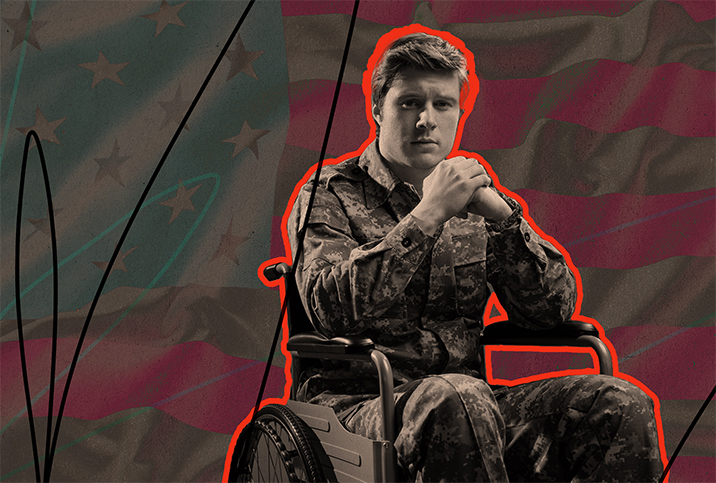How to Get an Erectile Dysfunction VA Disability Rating?

The same wounds, mental or physical, that qualify an American veteran for disability benefits through the Veterans Administration (VA), may also cause episodes of erectile dysfunction. But there is hope.
Veterans experience higher rates of post-traumatic stress disorder (PTSD) than the general population. Increased risk of devastating damage to the genitourinary system, including sexual organs. Numerous documented incidences of mental illness. High rates of sexual assault and trauma known to be associated with an increased risk of suicide and suicidal ideation.
These circumstances for military veterans are hardly conducive to good health, sexual or otherwise.
A number of factors related to military service might contribute to sexual dysfunction (SD) and, in particular, erectile dysfunction (ED) among male veterans, who may qualify for an erectile dysfunction VA rating. The population of male veterans is increasingly composed of older adults already predisposed to ED because of their age.
A growing body of research demonstrates the severity of the ED issue among veterans.
Researchers with Seattle Veterans Affairs (VA) worked with colleagues to conduct a systematic review of veterans and military personnel. Published in 2021, their findings suggest an association between PTSD and problems related to sexual function, as well as difficulties pertaining to a person's emotional relationship to sex. The review builds on previous research suggesting high rates of sexual dysfunction, erectile difficulties included, among veterans with PTSD.
A study from 2022 looked at a national sample of male military veterans in the United States. Researchers found ED was most prevalent among men older than 60 who served fewer than four years and saw combat, including in Vietnam.
A retrospective cohort study of more than 400,000 veterans was published in 2014 in the Journal of Sexual Medicine. It highlighted the prevalence of sexual dysfunction among former soldiers who accessed the U.S. Department of Veterans Affairs after returning from conflict in Iraq and Afghanistan.
Given the routine incidences of sexual dysfunction, veterans might be interested in seeking a disability rating and compensation for service-related dysfunction, such as ED.
The responsibility of the VA and the armed forces
Robert Owen, M.D., is a professor emeritus with the University of California San Francisco Department of Medicine and works with the UCSF-affiliated VA Medical Center. He acknowledged that the military's and VA's regulations and options related to service-connected healthcare are sometimes confusing and conflicting.
"But the general rule is that the military is supposed to return service people to their family in the same shape they got them," Owen said. "And they're responsible for any and all wear and tear. And that means anything that either begins in the service or has onset within one year of leaving the service or which later develops as a complication of something that did happen in the service."
Service-connected conditions and ED
Owen commonly sees patients who served, especially in Vietnam, develop diabetes that stems from exposure to Agent Orange, a toxic chemical herbicide the U.S. military used abroad. Researchers have demonstrated its association with other conditions and developments that can impair sexual health. These conditions include presentation with prostate cancer at a younger age and at more severe stages in exposed veterans compared to nonexposed veterans.
VA special monthly compensation (SMC) often pertains to secondary conditions such as PTSD and diabetes, according to Kelly Anderson, E.M.B.A., a U.S. Marine Corps veteran and assistant director of the Riverside County Department of Veterans' Services in Southern California. SMC is often paid to veterans in addition to any disability compensation they receive. In the case of veterans who have a 0 percent disability rating, SMC may provide a small monthly payment.
"Also, it can be related to [prostate] cancer," Anderson noted in an email conversation, adding that frequently "this cancer is related to Agent Orange exposure."
How to get a VA rating for ED
Anderson confirmed ED, or impotence, receives a 0 percent VA disability rating under SMC Category K, for loss of a creative organ. The VA typically grants the 0 percent service-connected VA rating to veterans with ED unless they're eligible under assigned diagnostic codes. These are tied to a partial loss of the penis, testicular atrophy or the loss of one or both testicles.
Owen said the 0 percent rating means the VA recognizes the issue and acknowledges that it somehow relates to military service. It doesn't distribute a check for $137 every month on the basis of that rating, however.
"But it's still valuable, because that means if you need to go see a urologist at the VA or if you need Viagra or whatever, you're not going to pay a copay for it," he said. "A lot of people think a 0 percent rating is they're just telling you, 'Oh, go screw yourself! Go away.' It's not [that]. A 0 percent is valuable, but it's just not a monetary compensation."
In some cases, thanks to a 0 percent rating, veterans with ED could qualify for SMC payments of $118.33, Anderson added.
Major trauma can change the equation. This trauma tends to entail life-altering concerns beyond just the (still serious) issue of ED, however.
"[During the] Persian Gulf period, when there were land mines and such, and people would step on them and it would blow off a leg and a testicle or whatever, they would obviously have erectile dysfunction, but that's sort of the least of their problems," Owen said.
"If somebody stepped on a land mine, they're probably going to have a whole lot more trouble with the fact that they can't control their urination. And that's going to be more of a concern than the fact that they can't get an erection."
Veterans with such circumstances probably would be awarded a 30 percent or 40 percent disability rating, he continued. Every month, they would get money to buy urine bags and various other items they need.
Owen said other health issues that affect veterans—diabetes due to metabolic disease that develops long after military service, for example—but lack the requisite service nexus do not tend to qualify. On the other hand, PTSD tied to service that leads to, say, depression and ED secondary to the service-related disorder would make a veteran eligible for a higher disability rating and special monthly compensation. So might medication prescribed for combat-derived complications that produce sexual dysfunction as a side effect.
"But one can always make an argument," Owen said, pointing to the not-insignificant quality-of-life issue and possible inability to procreate that can accompany ED and the loss of sexual function.
How to submit a claim to the VBA
Veterans seeking service-connected compensation submit claims to the Veterans Benefits Administration (VBA). The VBA is the branch of the VA responsible for processing and distributing payments. It also offers home loans, student loans and widow's and children's benefits, Owen said.
"A lot of veterans don't understand," he said about the sometimes confusing process. "They think that if they're going to a VA hospital and the doctor sees [them for] some condition…that automatically gets transferred over to the VBA for claim purposes, but it doesn't. One has to file a claim."
If the problem began when the guy was in the military, or if he thinks an in-service nexus exists, Owen recommends filing a claim with the VBA to receive compensation or accrue other worthwhile benefits. Select states maintain a Veterans Service Organization (VSO), like the county VSO system in California. Veterans go to the VSOs to consult service officers about filing claims.
The National Veterans Foundation maintains an online resource for accessing veterans service officers in each state and encourages users to send an email to admin@nvf.org if any of the state hyperlinks are broken.
"Although veterans can file claims on their own, I always recommend going to a VSO," Anderson said.
He made this recommendation because the representatives receive extensive training in assisting veterans with claims, and the number of claims they file each year substantially increases the odds the veteran will be successful in their claim.
"It's a little bit weird that a state agency helps you file a claim against the federal agency," Owen acknowledged. "But [that's] because it's a special instance. It's so complicated, and [there are] so many nuances. And sometimes the main reason people don't get service-connected compensation is they never file a claim in the first place."
A veteran suffering from ED might file a claim that gets rejected, but if he never files the claim in the first place, it cannot get approved.
Filing an ED-related VA claim
If a man becomes clinically depressed as a result of an inability to get an erection sufficient for sexual activity, and if that depression interferes with his work life, filing a claim in hopes of receiving compensation might not be futile.
"You could make an argument that this wasn't just a quality-of-life issue, but this was affecting your ability to support and care for yourself," Owen said.
In such circumstances, a veteran might be able to obtain compensation for depression secondary to their ED.
As a corollary, Owen said about 80 percent of people with military experience have hearing loss.
"If you work in a canning factory and it's noisy, you put in earplugs," he said. "But if you're in the Marines and you put in earplugs and somebody yells 'Duck!' and you can't hear him because you have earplugs, you get your head blown off. You can't use earplugs when you're in the military, and so a lot of people have acoustic trauma, or noise damage to their ears."
Yet, he said the VA pays 0 percent for hearing loss.
"But they'll give you a $6,000 set of hearing aids," Owen added. "And so it's really, really valuable to be service-connected for hearing loss, even though it's a 0 percent rating. You're not getting a check every month, because the sky's the limit on doing whatever they can do to fix it."
In regard to ED, beyond taking pills such as vardenafil and sildenafil, veterans can have treatment like penile injections completely covered without having to pay a dime, Owen said.
Veterans who don't want to deal with the possible side effects of oral drugs or receive injections into their penis have another option. Eddie® is an FDA-registered Class II medical device designed to treat erectile dysfunction and improve male sexual performance.
Shaped like an oval and open at the bottom, Eddie is worn at the base of the penis in front of the scrotum and secured by a tension band. It applies pressure where it belongs: on the veins, not the arteries or the urethra. Eddie was specially engineered to treat ED without the discomfort of other wearables or the side effects of medication. In 2021 clinical trials, 95 percent of men who used Eddie reported a positive effect on their sex life.
How to get an erectile dysfunction VA claim: The takeaway
Veterans who experience ED or another sexual dysfunction that seems to have originated from their time in the military are more or less always eligible to at least apply for compensation, and to seek assistance in doing so.
"I would definitely encourage them to apply for the compensation," Anderson said. "Even if they are not successful the first time, we can always appeal the decision. If we have the evidence to support their claim, they most likely will be successful in the end."


















